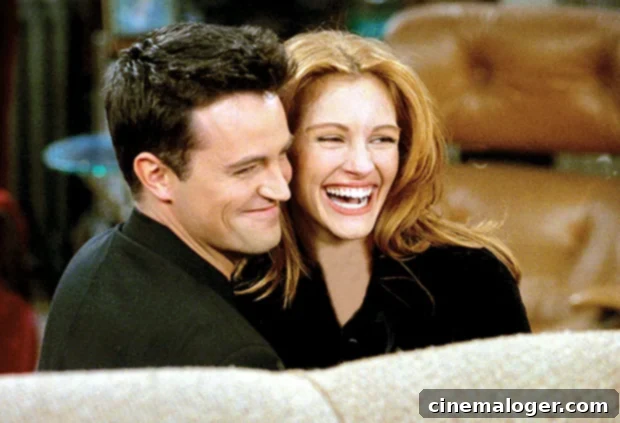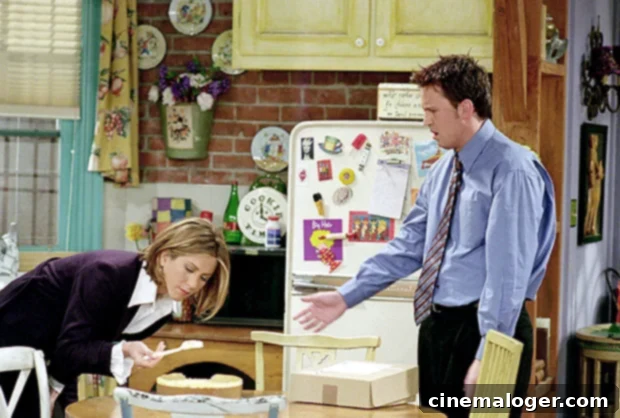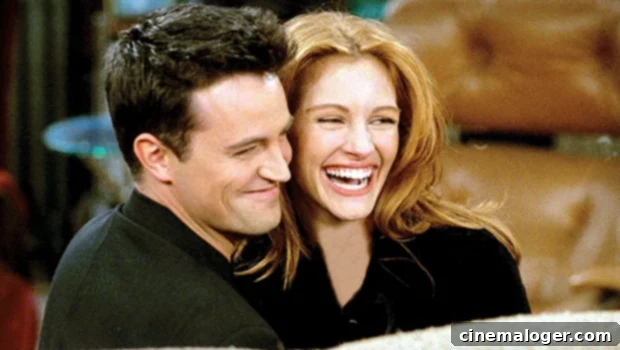Matthew Perry and Julia Roberts’ Secret Romance: Unpacking Their ‘Friends’-Era Love Story and Heartbreaking Split
In a world captivated by celebrity romances and the intricate lives of Hollywood’s elite, few revelations have sparked as much intrigue as Matthew Perry’s candid disclosure about his secret relationship with superstar Julia Roberts. The late “Friends” alum, known globally for his iconic portrayal of Chandler Bing, pulled back the curtain on a deeply personal chapter of his life in his powerful and poignant memoir, Friends, Lovers and the Big Terrible Thing. Among the myriad stories of his triumphs and struggles, the intimate details of his romance with the “Pretty Woman” actress stood out, offering a rare glimpse into the complexities of love under the intense glare of the Hollywood spotlight.
The relationship, which blossomed discreetly between 1995 and 1996, was a whirlwind affair that captured the hearts of fans once its existence was finally brought to light. Perry, with his characteristic blend of humor and raw honesty, recounted how this unexpected pairing came to be and, more poignantly, why it ultimately crumbled. His memoir revealed a vulnerability that many resonated with, highlighting how deeply personal insecurities, exacerbated by his then-unspoken battle with addiction, contributed to the painful decision to end a relationship with someone he openly admitted was likely “out of his league.”
The Genesis of a Hollywood Affair: “Friends,” Flowers, and Quantum Physics
The story of Matthew and Julia’s romance is inextricably linked to the cultural phenomenon that was “Friends.” In its second season, the show was a ratings juggernaut, and its post-Super Bowl episode was a coveted slot for guest stars. It was at this pivotal moment that “Friends” co-creator Marta Kauffman approached Matthew Perry with a proposition that would change his personal life forever. “Marta Kauffman approached me and said that I should probably send flowers to Julia Roberts,” Perry penned in his memoir, as reported by Us Weekly. His initial reaction was one of disbelief: “You mean the biggest-star-in-the-universe Julia Roberts? ‘Sure, great, why?’ I said.”
The reason behind this unusual request soon became clear: Julia Roberts had been offered the highly anticipated post–Super Bowl episode slot in season two. However, the celebrated actress, who at 55 was then a few years younger but already a cinematic icon, had a specific condition. She would only agree to appear on the show if she could be integrated into Matthew Perry’s storyline. This detail alone speaks volumes about the early spark and mutual interest that must have existed between them, even before their official interaction. Matthew, reflecting on the moment, couldn’t help but marvel at his good fortune: “Let me say that again— she would only do the show if she could be in my storyline. (Was I having a good year or what?).”
What followed was a courtship that was as unconventional as it was charming. Matthew, seizing the opportunity, sent Julia an extravagant gesture: three dozen roses. But it wasn’t just the flowers that sealed the deal. Per her unique request, he also sent a paper meticulously explaining quantum physics. This blend of classic romance and intellectual engagement clearly resonated with Julia, setting the stage for their burgeoning connection. These thoughtful gestures undoubtedly won Julia’s heart, paving the way for her highly anticipated appearance on “Friends.” By the time the now-legendary episode, “The One After the Superbowl,” aired in 1996, the on-screen chemistry between Perry’s Chandler and Roberts’ Susie Moss had spilled over into real life, and Matthew and Julia were officially a couple.
The Heartbreaking Split: Insecurity and Addiction’s Shadow
Their romance, though intense and seemingly fairytale-like to outsiders, was tragically short-lived. Just a few months after their “Friends” episode premiered and their relationship went public, the couple parted ways. The breakup, as revealed by Matthew Perry, stemmed from deeply personal struggles that cast a long shadow over his life, particularly his battle with addiction. It was a testament to his profound honesty that he confessed to being the one who initiated the split, driven by a crippling sense of insecurity that he felt was incompatible with dating one of the world’s most luminous stars.

Matthew’s raw admission laid bare the internal turmoil he experienced: “Dating Julia Roberts had been too much for me. I had been constantly certain that she was going to break up with me — why would she not? I was not enough; I could never be enough; I was broken, bent, unlovable.” This poignant reflection underscores the insidious nature of self-doubt, particularly when compounded by the pressures of fame and the isolating grip of addiction. He genuinely believed that a star of Julia Roberts’ magnitude deserved someone more whole, someone who wasn’t battling the demons he was secretly fighting. His insecurities were further fueled by his dependency on pain medication, which eroded his self-worth and distorted his perception of reality. He rationalized that by ending the relationship himself, he could preempt the “inevitable agony” of being left by her. In his own words, he recounted the painful irony: “So instead of facing the inevitable agony of losing her, I broke up with the beautiful and brilliant Julia Roberts. She might have considered herself slumming it with a TV guy, and TV guy was now breaking up with her.” This heartbreaking detail highlights the profound impact of his internal struggles on his ability to sustain a healthy relationship, even with someone as adored and understanding as Julia Roberts.
A Decades-Long Battle: Matthew Perry’s Journey Through Addiction
The story of his relationship with Julia Roberts, while compelling, was merely one facet of a larger, more arduous battle that Matthew Perry bravely documented in his memoir: his decades-long struggle with addiction. The book served as an unflinching account of his descent into dependency, detailing his reliance on a terrifying cocktail of substances including Vicodin, Methadone, Xanax, and alcohol. His candor about the severity and longevity of his addiction shocked many, but also resonated deeply with those who have faced similar challenges.
Perry’s memoir wasn’t just a chronicle of his pain; it was also punctuated by his signature wit and self-deprecating humor, even when discussing the darkest periods of his life. He famously quipped, “People would be surprised to know that I have mostly been sober since 2001. Save for about sixty or seventy little mishaps over the years.” This statement, while humorous, underscored the immense difficulty and persistent nature of recovery, revealing that sobriety is a continuous journey marked by both progress and setbacks. His openness about these “mishaps” normalized the imperfections of recovery and offered a more realistic portrayal of what it means to live with addiction. Through his memoir, Matthew Perry transcended the persona of Chandler Bing to become an advocate for mental health and addiction awareness, using his own story to shed light on a pervasive issue that often remains shrouded in shame and secrecy.

The Unwavering Support of a Friend: Jennifer Aniston
Beyond the romantic entanglements, Matthew Perry’s memoir also paid tribute to the enduring power of friendship, particularly the steadfast support he received from his “Friends” co-star, Jennifer Aniston. As he promoted his tell-all book, Perry openly confessed that Aniston, his television wife and a lifelong confidante, was the one who consistently “checked in on him the most amid his struggles.” His gratitude was palpable: “I’m really grateful to her for that,” the troubled actor stated during a poignant interview with Diane Sawyer that aired on ABC on October 28.
He further elaborated on the depth of their bond, revealing that “Jenny,” as he affectionately called her, didn’t shy away from confronting him about his excessive drinking. This wasn’t a casual inquiry but a direct, loving intervention. “Imagine how scary a moment that was,” he reflected, highlighting the courage it took for Aniston to address such a sensitive and difficult topic, and the raw vulnerability he experienced in that moment. Her willingness to confront him, despite the potential discomfort, underscores the profound level of care and genuine concern she held for his well-being. This powerful anecdote provided a testament to the real-life bonds forged amongst the “Friends” cast, showcasing a loyalty and support system that extended far beyond the soundstage.
Jennifer’s presence loomed large in his memoir, not just in discussions about his struggles, but also in tales of his earlier romantic life. The “Fools Rush In” star admitted that he harbored feelings for Aniston before they became co-stars, recounting his attempts to pique the Morning Show actress’ interest in him. However, much to his chagrin, his attempts fell flat. Despite the initial unrequited feelings, Matthew noted that by the time they began working together on “Friends,” they were “able to sail right past the past and focus on the fact that [they] had both gotten the best job Hollywood had to offer.” This ability to move beyond personal history and collaborate professionally speaks volumes about their maturity and the deep respect they held for each other, ultimately cementing a friendship that would prove invaluable through life’s many challenges.
Matthew Perry’s memoir offered a final, profound look into the life of a beloved actor who grappled with immense personal pain while entertaining millions. His story with Julia Roberts, though brief, remains a poignant reminder of how personal demons can overshadow even the brightest lights of Hollywood romance, and how true friendship can endure through the darkest of times. His honesty about his vulnerabilities, his addictions, and his relationships continues to resonate, cementing his legacy not just as a comedic genius, but as a courageous voice for mental health and recovery.
